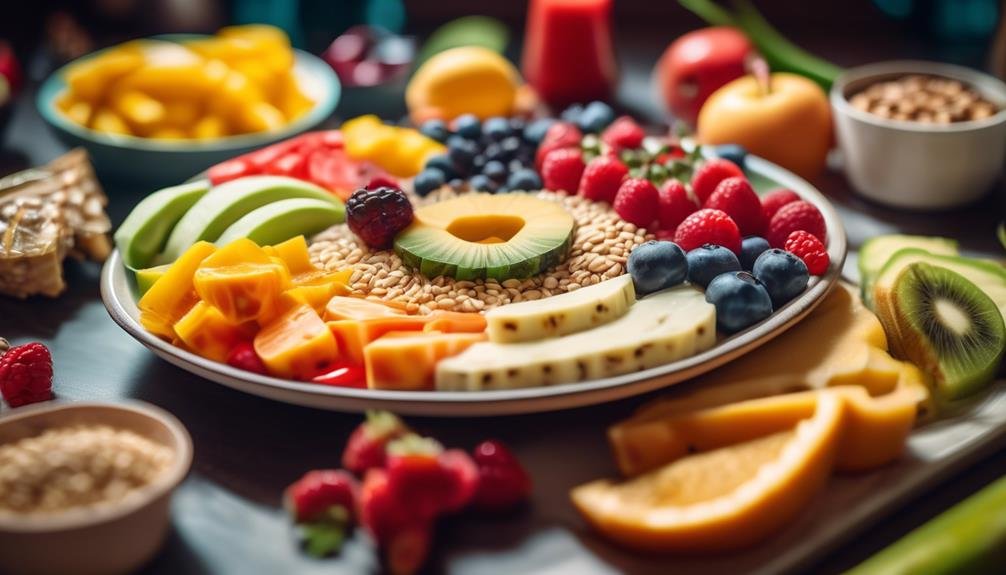"Cherishing Little Steps - A Haven for Baby and Family Journeys"
Physical Activity and Nutrition
Are you tired of feeling sluggish and out of shape? It's time to kick those bad habits to the curb and start taking care of yourself.
With physical activity and proper nutrition, you can transform your life and achieve the health and vitality you've always dreamed of.
But where do you begin? How do you navigate the world of fitness and nutrition without feeling overwhelmed?
Well, buckle up because we're about to take you on a journey that will leave you feeling motivated, inspired, and ready to make some real change.
Get ready to discover the incredible benefits of regular exercise, the role of nutrition in fueling your body, practical tips for creating a balanced meal plan, and how to seamlessly incorporate physical activity into your daily routine.
It's time to take charge of your health and embark on a path to a healthier, happier you. Are you ready?
Key Takeaways
- Regular exercise helps maintain a healthy weight and reduces the risk of chronic diseases.
- Nutrition provides necessary energy and essential nutrients for the body.
- Creating a balanced meal plan involves planning ahead, portion control, and making informed food choices.
- Incorporating physical activity into your routine and setting realistic goals reduces the risk of chronic diseases.
The Benefits of Regular Exercise

Regular exercise offers numerous benefits for your physical and mental well-being. Not only does it help you maintain a healthy weight and reduce the risk of chronic diseases, but it also plays a significant role in improving mental health and increasing energy levels.
When it comes to mental health, regular exercise has been shown to have a positive impact. It can help reduce symptoms of depression, anxiety, and stress. Exercise stimulates the release of endorphins, which are natural mood boosters, and it also increases the production of neurotransmitters like serotonin and dopamine, which play a crucial role in regulating mood and emotions.
Additionally, engaging in physical activity on a regular basis can lead to increased energy levels. Exercise improves blood flow and oxygen delivery to your muscles, helping them work more efficiently. This, in turn, leads to increased stamina and endurance, allowing you to perform daily tasks with less fatigue. Regular exercise also improves sleep quality, which further contributes to increased energy levels throughout the day.
Understanding the Role of Nutrition
To fully understand the impact of nutrition on your overall health and well-being, it is essential to recognize the vital role it plays in fueling your body and supporting optimal functioning. Proper nutrition not only provides the necessary energy for daily activities but also supplies essential nutrients that are crucial for growth, repair, and maintenance of your body's tissues. Two key aspects to consider when it comes to nutrition are the importance of macronutrients and understanding portion control.
Macronutrients are the nutrients that your body needs in large amounts to function properly. These include carbohydrates, proteins, and fats. Carbohydrates are your body's main source of energy, while proteins are essential for building and repairing tissues. Fats, on the other hand, provide energy, help absorb certain vitamins, and play a role in hormone production. It is important to consume a balanced mix of these macronutrients to meet your body's needs.
In addition to understanding macronutrients, portion control is another crucial aspect of nutrition. Portion control refers to being mindful of the amount of food you consume. It is not only about the types of food you eat but also about how much you eat. By practicing portion control, you can ensure that you are consuming adequate nutrients without overeating. This can help maintain a healthy weight and prevent the risk of chronic diseases.
To summarize, nutrition plays a vital role in fueling your body and supporting optimal functioning. Understanding the importance of macronutrients and practicing portion control are essential for maintaining a healthy diet and overall well-being. By making informed choices about the foods you eat and being mindful of portion sizes, you can promote good health and improve your quality of life.
| Macronutrients | Function |
|---|---|
| Carbohydrates | Provide energy for daily activities |
| Proteins | Build and repair tissues |
| Fats | Provide energy and aid in hormone production |
Creating a Balanced Meal Plan

Understanding the role of nutrition lays the foundation for creating a balanced meal plan that supports your overall health and well-being. When it comes to meal prep strategies, there are a few key points to keep in mind.
First, plan your meals ahead of time. This allows you to make healthier choices and avoid impulsive decisions based on convenience. Consider batch cooking on weekends, so you have nutritious meals ready to go throughout the week.
In addition to meal prep, portion control techniques are essential for maintaining a balanced meal plan. Use smaller plates and bowls to help control your serving sizes. Fill half of your plate with vegetables, one quarter with lean protein, and the remaining quarter with whole grains or starchy vegetables. This method ensures that you're getting a variety of nutrients while keeping calorie intake in check.
Another effective portion control technique is to listen to your body's hunger and fullness cues. Eat slowly and mindfully, paying attention to when you start to feel satisfied. This helps prevent overeating and allows your body to properly digest and absorb the nutrients from your meals.
Incorporating Physical Activity Into Your Routine
Incorporating physical activity into your routine is crucial for maintaining a healthy lifestyle and improving overall fitness levels. Regular exercise not only helps you stay fit but also reduces the risk of chronic diseases like heart disease, diabetes, and obesity.
To make physical activity a part of your daily life, here are some tips to get you started:
- Find activities you enjoy: Look for exercises that you find enjoyable, whether it's dancing, swimming, or playing a sport. When you enjoy what you're doing, it's easier to stay motivated and committed.
- Set realistic goals: Start with small, achievable goals and gradually increase the intensity and duration of your workouts. This will help you stay on track and avoid burnout.
- Use exercise equipment wisely: Incorporate exercise equipment like dumbbells, resistance bands, or a stationary bike into your workouts to add variety and challenge. Choose equipment that suits your fitness level and preferences.
- Create a workout routine: Plan your physical activity in advance and make it a part of your daily schedule. Whether it's a morning jog, a lunchtime workout, or an evening yoga session, having a routine will make it easier to stick to your exercise goals.
Tips for Maintaining a Healthy Lifestyle

Maintaining a healthy lifestyle requires implementing effective strategies that go beyond incorporating physical activity into your routine. Two important aspects to consider are hydration and mindful eating techniques.
Staying hydrated is crucial for overall health. Water helps regulate body temperature, aids digestion and nutrient absorption, and keeps your joints lubricated. It's recommended to drink at least eight glasses of water per day, but individual fluid needs may vary based on factors such as activity level and climate. Remember to listen to your body and drink water when you feel thirsty.
In addition to hydration, practicing mindful eating techniques can help you maintain a healthy lifestyle. Mindful eating involves paying attention to the present moment and being aware of your food choices and eating habits. It can include eating slowly, savoring each bite, and listening to your body's hunger and fullness cues. By practicing mindful eating, you can develop a healthier relationship with food and prevent overeating.
Incorporating these strategies into your daily routine can have a significant impact on your overall well-being. Stay hydrated and practice mindful eating techniques to support your journey towards a healthier lifestyle.
Frequently Asked Questions
How Can I Stay Motivated to Exercise Regularly?
You can stay motivated to exercise regularly by setting fitness challenges for yourself. These challenges can help keep you engaged and interested in your workouts, giving you a sense of accomplishment and pushing you to continue.
What Are Some Healthy Snack Options to Support My Physical Activity?
You're wondering about healthy snack options to support your physical activity. Well, there are plenty of tasty choices like Greek yogurt with berries, almonds, or a banana with peanut butter. These snacks provide essential nutrients and aid in post-workout nutrition.
Can I Still Achieve My Health Goals if I Can't Afford a Gym Membership?
You can still achieve your health goals even if you can't afford a gym membership. There are affordable alternatives like home workouts that can be just as effective and help you stay active.
How Much Water Should I Be Drinking During Physical Activity?
During physical activity, it's important to stay hydrated. Drinking water not only prevents dehydration, but also helps regulate body temperature, improve performance, and support overall health. Stay refreshed and drink up!
Are There Any Specific Exercises That Can Help Target Certain Areas of the Body?
To target specific areas of your body, there are exercises for toning and increasing flexibility. These exercises can help you sculpt and strengthen different muscle groups, allowing you to achieve the results you desire.
Conclusion
In conclusion, regular physical activity and proper nutrition are essential for maintaining a healthy lifestyle.
While some may argue that it's difficult to find time for exercise and prepare nutritious meals, the benefits far outweigh the challenges.
Research shows that exercise improves cardiovascular health, boosts mood, and reduces the risk of chronic diseases.
Additionally, a balanced meal plan provides the necessary nutrients for optimal functioning.
By incorporating physical activity and nutritious meals into your routine, you can overcome any obstacles and enjoy a healthier life.



Attractive section of content. I just stumbled upon your blog and in accession capital to assert that I get actually enjoyed account your blog posts. Anyway I will be subscribing to your augment and even I achievement you access consistently fast.
I’ve read several just right stuff here. Certainly price bookmarking for revisiting. I wonder how a lot effort you place to create this kind of great informative website.